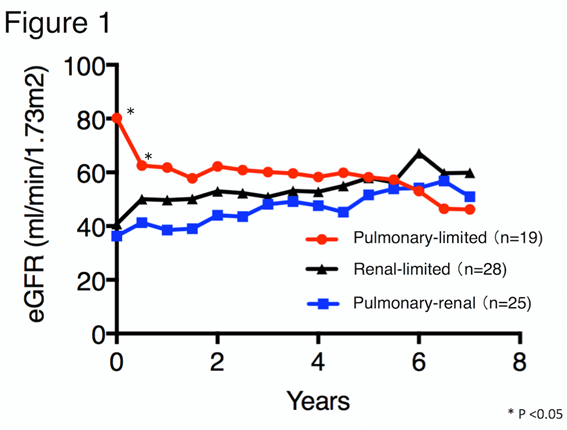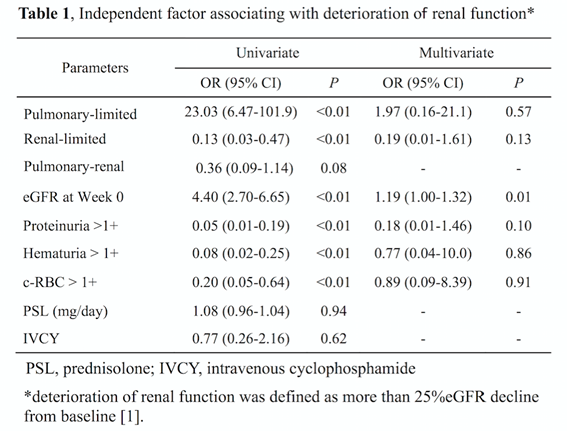Session Information
Session Type: ACR Poster Session B
Session Time: 9:00AM-11:00AM
Background/Purpose: Patients with pulmonary-renal or renal-limited microscopic polyangiitis (MPA) frequently manifested with rapidly progressive glomerular nephritis resulting in chronic renal failure if clinical response to the remission induction treatment was not successfully obtained. In contrast, pulmonary-limited MPA lacks renal involvement at diagnosis and its long-term renal outcome after remission induction treatment has been poorly investigated. Here, we compared long-term renal outcome of pulmonary-limited MPA with that of pulmonary-renal and renal-limited MPA.
Methods: We retrospectively examined the patients who met the MPA diagnostic criteria and received induction therapy. We divided them into 3 groups, pulmonary-renal, renal-limited and pulmonary-limited MPA and evaluated estimated glomerular filtration rate (eGFR) for 5 years. We further investigated the pathological features of kidney on available sample.
Results: Twenty-five patients with pulmonary-renal, 28 with renal-limited, and 19 with pulmonary-limited type were enrolled. At baseline, significantly higher eGFR, lower incidence of active sediment, lower BVAS, and lower titer of MPO-ANCA were observed in pulmonary-limited type comparing with other types (p<0.01, p<0.01, p<0.01, p=0.02, respectively). Initial treatment regimens including glucocorticoid dose, %cyclophosphamide use, and %rituximab use were not significantly different among the groups. The eGFR of patients with pulmonary-renal and renal-limited types was significantly improved (p=0.01, p=0.03) whereas that of pulmonary-limited was deteriorated (p=0.05), resulting in no difference of eGFR at year 5 in all types comparison (Figure 1). By multivariate analysis, eGFR at baseline was independently associated with the deterioration of renal function (OR1.2, 95%CI 1.00-1.32, p=0.01) (Table 1). Renal specimen showed a higher percentage of interstitial cell infiltrate was observed in patients with high eGFR (≥ 60 ml/min) at baseline than those with low (< 60 ml/min).
Conclusion: Renal outcome of pulmonary-limited MPA was not significantly different from that of pulmonary-renal and renal-limited MPA for 5 years observation. Subclinical renal involvement or interstitial inflammation may proceed in some patients with pulmonary-limited MPA and carful observation is required.
Reference
1. Mukhtyar C, et al. Modification and validation of the Birmingham Vasculitis Activity Score (version 3). Ann Rheum Dis. 2009;68:1827-32.
To cite this abstract in AMA style:
Hanaoka H, Iida H, Kiyokawa T, Takakuwa Y, Kawahata K. Long-Term Renal Outcome in Pulmonary-Limited Microscopic Polyangiitis [abstract]. Arthritis Rheumatol. 2018; 70 (suppl 9). https://acrabstracts.org/abstract/long-term-renal-outcome-in-pulmonary-limited-microscopic-polyangiitis/. Accessed .« Back to 2018 ACR/ARHP Annual Meeting
ACR Meeting Abstracts - https://acrabstracts.org/abstract/long-term-renal-outcome-in-pulmonary-limited-microscopic-polyangiitis/


